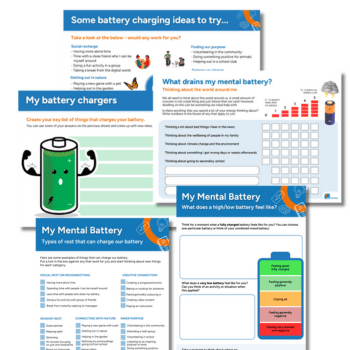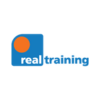Use these free mental health worksheets to help children and young people understand what drains and recharges their emotional and mental energy.
The separate resources for primary (Year 5 up) and secondary (Year 8 up) encourage reflection on daily stressors and restorative activities, providing practical tools for managing emotional wellbeing.
Primary mental health worksheets
The primary resource is ideal for Year 5 and 6 pupils. It’s a self-reflection tool to help children become more aware of what they spend a lot of mental and emotional energy think about or doing. It also encourages them to consider how they can recharge when they are feeling drained.
While this resource is not an anxiety screener, it may lead to discussions about anxiety and worry. Explain to children that we all get worried about events in the short term, and that a small amount of stress helps us perform well.
Likewise, having concerns about things like climate change shows that we care about the world. Explain that if we start to worry excessively, it’s a good idea to talk to an adult.
‘What drains my mental battery?’ worksheet
This worksheet asks children to write a number from 0-5 against a variety of statements related to the world around us, our relationship with peers, our routine, our learning and our senses and environment. The number relates to whether the issue in question drains our battery (5) or not (0).
Children will then go on to think about what charges their mental battery, from doing something creative to speaking to someone about our worries.
Finally, children can use the provided weekly planner templates to spend a week reflecting on what drained their battery and what charged it. They can then make a plan for some battery charging activities for the following week.
Secondary mental health worksheets
The secondary resource is aimed at Year 8 upwards and can be used for small group work or during PSHE lessons. It will help students manage stress, anxiety and other things they find emotionally draining. Students will identify things that can boost their personal resilience.
‘My mental battery’ worksheet
Students will use the included worksheet to think about what a fully charged or very low battery feels like for them, whether it’s their social, cognitive, sensory or emotional battery.
They will spend time thinking about what drains their battery and reduces their ability to tolerate stressful events. This might include:
- Not enough time on their own
- Difficulties with a particular subject
- Taking the bus to school
- Worrying about things going on in the world
Students will then go on to think about what types of rest can charge their battery, whether that’s social or creative connection, connecting with nature, emotional release or physical rest.
The included self-help templates will assist pupils in reflecting on what drained their battery and what charged it during the last week.
Energy accounting
The original principle of ‘energy accounting’ was outlined by psychologists Maja Toudal and Dr Tony Attwood to help autistic children, but it can be a useful tool for everyone.
Real Training provides award-winning SEND and mental health training for education professionals.











